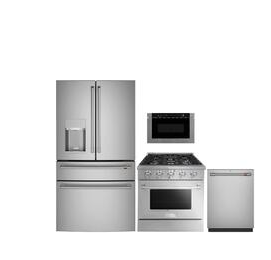Refrigerator Buying Guide

Buying a refrigerator goes beyond selecting the most beautiful, if you do not know how to do it, we share some tips that will help you.
The refrigerator is one of the essential elements for your home.
Choosing it is a decision that you must take seriously, because it is not just about selecting the most beautiful or that matches the decoration of your kitchen, there are other technical and logistical aspects that you must keep in mind before acquiring it. If you don't know how to choose one among the different options, we share several tips that will help you.
Basics when choosing your refrigerator

Typically, many of the white goods out there are oversized, and the refrigerator is no exception. Before selecting it, make sure you have enough space at home to place it. Measure the height and width of the space you have at home and, based on that, choose the refrigerator that best suits those measurements.
Another important aspect is knowing what size refrigerator is right for your home. This factor depends largely on the number of people occupying it: a very large refrigerator will become an unnecessary expense for two people. It will be difficult to fill and is likely to store food that can last for days and become a waste and bacteria deposit. On the other hand, a very small refrigerator will hardly meet the needs of a large family.
Once you have it at home, we recommend locating your new refrigerator as close as possible to the water sources, that is, the sinks. You should never place it near the microwave oven or any other heat generator, even if there is a partition wall between them.
Also, remember that there must be space available to open the doors easily.
Technical factors you need to know

Size and capacity. Many manufacturers recommend that a capacity of 19 to 22 cubic feet is ideal for a family of 4.
Compartments. Consider the amount of food you usually store and how useful any of the options can be for you to organize.
Energy saving. Refrigerators have a label that classifies their energy consumption from A to F. If you have a good rating, you will use less electricity, you will support the environment and your investment will last longer.
Cooling system. Modern refrigerators are generally no frost, so they no longer collect a layer of ice in the freezer, thus saving you the hassle of defrosting it.
In addition, they cool through air circulation, making an intelligent distribution of temperature in the refrigerator.










